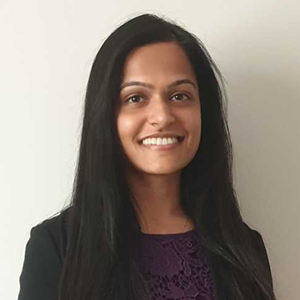Why did you choose a job in this profession?
I very much enjoyed my PhD, but as it came to an end I wasn’t sure that a future in academia was for me. As I’m sure is a familiar feeling to many, I wasn’t sure exactly what I wanted to do, but what I did know is that I didn’t want to leave science completely. A career as a patent attorney seemed like a good fit for me. It allowed me to use and build upon my scientific knowledge but with a different focus to academic research.
What are your main duties?
As a trainee at Mewburn, I have been involved in case work from the start. My main duties are to help clients during different stages of the patent prosecution process. Often when a client applies for a patent, the patent examiner raises several objections to the patentability of it. Most of my work involves trying to persuade patent examiners that the client’s invention is patentable by preparing arguments to the objections that they have raised. The arguments are based on technical aspects as well as law. I work on multiple cases at any one time and each case is about something completely different. This is one of the things that makes this job so interesting.
I have also had the chance to help prepare for oral proceedings. Since many oral proceedings now take place via video conferencing, there are lots of opportunities to watch how these are carried out. As a trainee, I am supervised by a partner in the firm. The partners set you work and give you feedback. At Mewburn, we rotate partners every six months which allows us to work with different types of clients, carry out different tasks and learn different ways of working. I’ve found this really useful as it has allowed me to become aware of many different problems that arise and how they can be solved.
Is it a 9-5 job?
On the most part the job is 9-5. However, there are times where you need to work longer hours in order to meet deadlines. Occasionally instructions from a client can come in last minute and this will need to be dealt with. However, on the most part if the deadline is already known, having to do something last minute can at least be anticipated. Although the job is generally 9-5, as a trainee you will also need to spend time studying for exams and much of this is done in your own time.
What skills are useful in this profession?
Good communication is key to many aspects of the job such as writing persuasive arguments, talking to clients to understand their inventions and explaining legal concepts to them in a digestible manner. An analytical and creative mind will also be helpful when responding to objections from examiners and during oral
proceedings. As you’ve probably heard, having good attention to detail is also very important.
Do you have any advice for anyone wanting to join the profession?
Try and get as much information as possible before applying e.g. by attending open days, talking to people in the profession and looking online. It’s difficult to know exactly what something is like until you do it, but hopefully this will help you get a better feel for what the job entails.
When applying, ensure you proof-read your CV and cover letter…attention to detail is key as a patent attorney. Getting into the profession is competitive so apply for advertised roles but also send out speculative applications. Although you may send out a lot of applications, try to research the firms and if possible talk to people within the firms to find somewhere that suits you.
When preparing for interviews make sure you can clearly explain any research you have previously conducted. Also practice describing everyday objects in one sentence, trying to identify the key features which differentiate it from other similar objects. It can be daunting applying for a position as a trainee patent attorney without knowing much about law, but don’t let it put you off. You will learn on the job and hopefully the firm will have a good training programme to help you along.
Finally, there are exams to pass and these go on for a few years. They do take a lot of time to study for and are not easy, so you will need to be committed. Ask the firms you apply to about their training programme and how they support you through the exams. Hopefully this will help you towards deciding on a firm that is right for you. Good luck!







